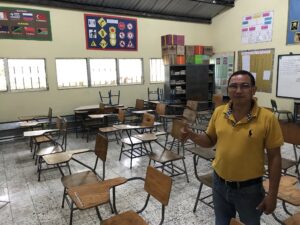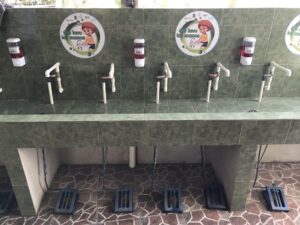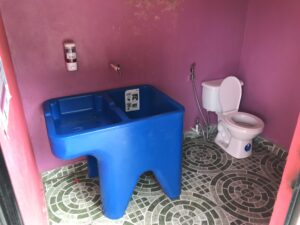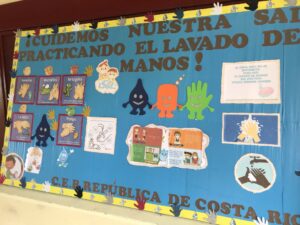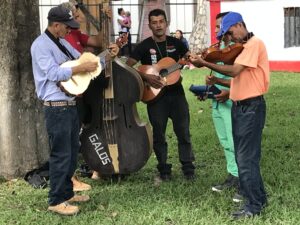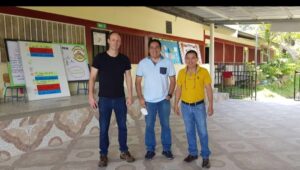 Buenos dias todos! I recently returned from my first visit with Pure Water for the World’s team in Honduras. It’s been a long 2 years, 7 months since I last put my passport to use. While a global pandemic has created challenges and hardships for millions in the US and around the world, it did not stop the PWW teams in Haiti and Honduras from carrying out our life-changing work. The water, sanitation and hygiene (WASH) programs PWW delivers have been critical to keeping thousands of families safe and healthy these past two years. It was a privilege to meet some of the families that have welcomed the PWW team and our WASH programs that bring health, hope and opportunity to their communities.
Buenos dias todos! I recently returned from my first visit with Pure Water for the World’s team in Honduras. It’s been a long 2 years, 7 months since I last put my passport to use. While a global pandemic has created challenges and hardships for millions in the US and around the world, it did not stop the PWW teams in Haiti and Honduras from carrying out our life-changing work. The water, sanitation and hygiene (WASH) programs PWW delivers have been critical to keeping thousands of families safe and healthy these past two years. It was a privilege to meet some of the families that have welcomed the PWW team and our WASH programs that bring health, hope and opportunity to their communities.
This was my fifth visit to Honduras, and I could not wait to return. The generosity and hospitality of the people is apparent from the moment you arrive, and it’s easy to put on a few extra pounds during your stay with ‘plato típico’ served each morning for breakfast.
While you could spend days exploring the Mayan ruins of Copán Ruinas or lounging on the beaches of Tela and Roatán (which I highly advise you add to a Honduras itinerary), traveling with the PWW team takes you off the beaten path to remote and underserved communities where very few visit.
My journey began in the western highlands, in the town of Jesus del Otoro, where we visited a school in the hills high above the town center. The energy and commitment shown by school teacher Maximino Ramos (Max) for his students was contagious. Max gave us a tour, showing off the new restrooms, handwashing stations and menstrual hygiene facility that the PWW team installed for the schools’ 130 students and teachers. The menstrual hygiene ‘module’ is a large enclosed bathroom that provides resources for female students and teachers to address menstrual hygiene necessities while at school. Having this essential resource directly contributes to increased school attendance and supports female adolescent students with staying in school to achieve an education.
After attending a school bbq, where Max and fellow community members made sure I was well fed, it was off to Trojes, a regional hub located in southeast Honduras along the Nicaraguan border.
PWW has been working in the Trojes region of Honduras since 2009. This remote and underserved region has experienced its share of recent challenges, including having been hit by back-to-back hurricanes in 2019 (Eta and Iota) that resulted in extensive infrastructure damage. Over the past couple of years, the town of Trojes (a border stop into the country) has been receiving upwards of 500 migrants per day as they work their way through Central America.
PWW’s Trojes staff, born and raised in the region, have been hard at work preserving local WASH infrastructure and supporting families still recovering from Eta and Iota with WASH resources, while continuing to expand WASH programs to more communities in the greater region.
Our first community visit in the Trojes region was to Río Arriba where, thanks to the Trinity (FL) Rotary Club and Traverse City Rotary Club, our team is completing work on the installation of latrines, showers, and rainwater harvesting and septic systems at the local health clinic.
Nuris Yones, health clinic nurse, shared how the newly installed WASH resources are allowing the clinic to expand their reach to serve more community members. Nolvia Lagos, a local vendor, told me that the old bathrooms had been destroyed (by the hurricanes), expressing the new facilities are “beautiful” and include handwashing stations, which they did not have before.
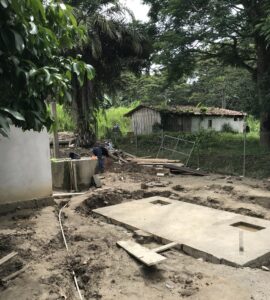
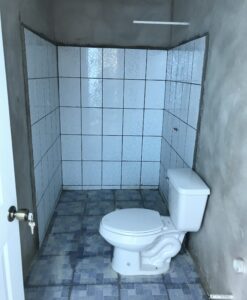
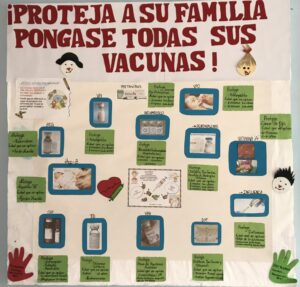
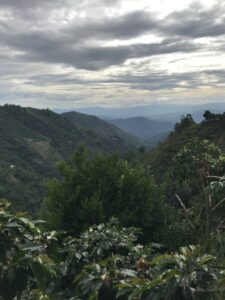 From Río Arriba, it was off to the community of El Onal, where homes are dispersed across mountain tops and tucked into deep valleys. The drive to El Onal is an adventure and, for those up to the challenge, my strongest piece of advice is…don’t look down!
From Río Arriba, it was off to the community of El Onal, where homes are dispersed across mountain tops and tucked into deep valleys. The drive to El Onal is an adventure and, for those up to the challenge, my strongest piece of advice is…don’t look down!
After a winding climb over a mountain top on narrow roads, we reached the home of Rosa Rodriguez (pictured). Set on a piece of land overlooking a mountain valley with views as far as the eye can see, Rosa invited us into her home to see the biosand water filter that had been installed by the PWW team. Rosa shared that, prior to receiving the filter, her family had very few options to access safe drinking water and was often sick with stomach problems due to drinking contaminated water. Since receiving the filter, her family has been much healthier, no longer experiencing stomach illnesses.
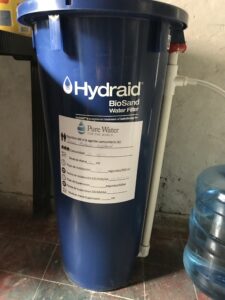
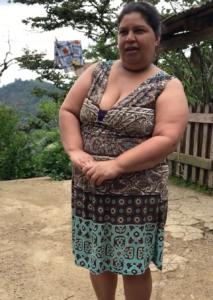 “It’s like the same thing as buying purified water, because we are drinking purified water!” Rosa gratefully expressed.
“It’s like the same thing as buying purified water, because we are drinking purified water!” Rosa gratefully expressed.
We also visited the home of Marvin Cabrera who shared that, prior to receiving their biosand filter, his family filtered their water through a colander but had no means to purify the water. The family is now drinking filtered water, a resource previously unavailable to them due to the remoteness of their community.
The homes of Rosa and Marvin are just two of 58 in El Onal that now have safe drinking water thanks to generous support from Clarke Cares and many individual donors.
Our final stops for this visit were in the communities of El Coyote and El Retiro, located in the region of Maraita, where PWW began working in 2019. As had been the case in Jesus del Otoro and the Trojes communities, we were able to, once again, witness the positive impact created with biosand water filters, latrines and handwashing stations.
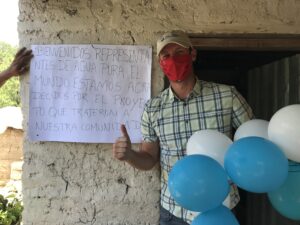
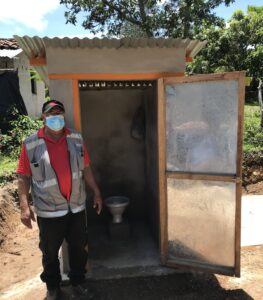
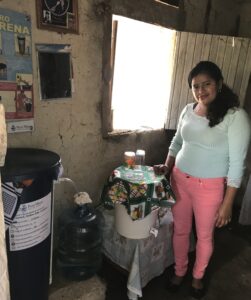
At a school in El Retiro, the difference between the old bathrooms that students and teachers had previously been using versus the newly constructed latrines and handwashing station was hard to believe. One look between the old and new WASH facilities was all it took to feel assured that the 35 students at this school today (and all future students) are supported with a much safer and healthier environment while at school.
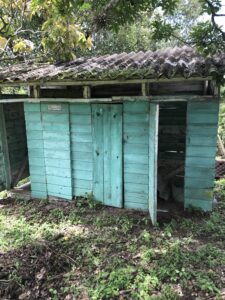
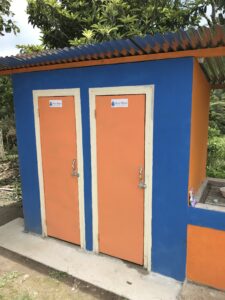
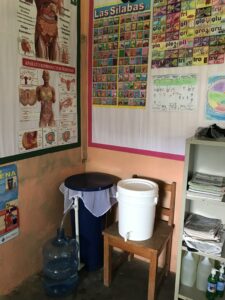
We are grateful for the generous support from Milford (NH) Rotary Club and the Permanent Endowment Fund of Moody Methodist Church for making this work in Maraita possible.
True to Honduran hospitality, our visit in Maraita wrapped up with a memorable gift offered by the Mayor, Moisés Vargas…local coffee, sweet bread, and a performance by a very talented local mariachi band. A perfect end to the visit.
My visit was complemented by getting to know team members from PWW’s Calgary-based partner, the Centre for Affordable Water and Sanitation Technology (CAWST). CAWST staff members Lisa Mitchell, Ivana Corce, and Ana Gabriela have been supporting PWW’s WET (Water Expertise Training) Centre, strengthening our ability to build local WASH capacity through training and consulting services.
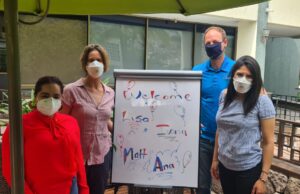 We believe firmly that water is the path to development and education is the path to sustainability. While direct implementation of WASH resources will always be a critical part of our work and a way to stay connected to and understand community needs, WASH education and training will allow us to scale-up our reach, ensuring thousands more families receive life-changing WASH resources via local organizations.
We believe firmly that water is the path to development and education is the path to sustainability. While direct implementation of WASH resources will always be a critical part of our work and a way to stay connected to and understand community needs, WASH education and training will allow us to scale-up our reach, ensuring thousands more families receive life-changing WASH resources via local organizations.
Thank you to the CAWST team for their leadership and commitment to PWW!
I’m now stateside with my bags unpacked. And while I’m settling back into familiar routines, I’m challenged to be more careful with, more thoughtful of and ultimately more grateful for the ease by which I can access safe water…life’s most basic necessity…available to me by simply turning on a tap. I’m motivated by the PWW Honduras team that travels dangerous roads delivering WASH resources to the most remote communities. I’m inspired by the thousands of local community members who raise their voices, asking for assistance, so that their families can live healthier, more prosperous lives. I’m committed to faithfully stewarding the generous financial resources that are given by so many of you in support of PWW’s impactful WASH programs.
This work does not happen without your support. We are grateful to each of you for being on this journey with us. You are changing lives. Thank you.
Hasta luego,
![]()

